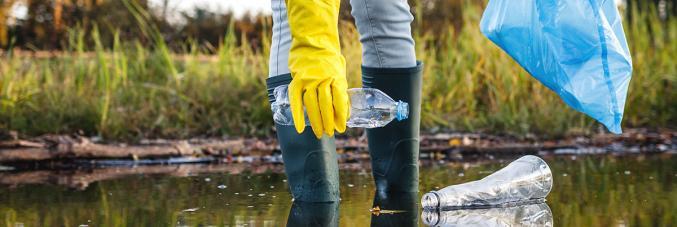
Plastic waste in rivers and seas: how good management can mitigate pollution
03.04.2023
Most of the waste found in the marine environment derives from a land-based origin that is transported towards coastal-marine ecosystems through rivers and canals. By managing the interception of waste in waterways as they pass through urban areas, plastic pollution along coastal and marine waterways can be greatly mitigated.
These and other findings are included in a study carried out on the waste collected in the canals of the city of Padua by a group of researchers from the Departments of Civil, Environmental and Architectural Engineering, Industrial Engineering, and Biology under the coordination of Maria Cristina Lavagnolo, in collaboration with the Cooperativa Sociale Piovego.
Published in detritus, a Multidisciplinary Journal for Waste Resources & Residues, the study entitled Waste characterization in the urban canal network of Padova (Italy) to mitigate downstream marine plastic pollution shares results of the waste collection campaigns carried out in 2021 along three representative points of the channel network located in the historic center of Padua.
Approximately 500 kg of waste was collected and analysed in terms of size (particle size analysis) and the type of material (product analysis). Findings confirm that plastics account for over 47% of the waste with a particular abundance of disposable products, such as food packaging, shopping bags and beverage containers.
Researchers examined the waste collected over different seasons to estimate the total amount of waste that could be recovered over a single year from the canal network of the city of Padua. The work also highlights that the waste present on embankments and riparian vegetation is much greater than that present in the water.
The capacity of the riparian vegetation to act as a mechanical filter against waste, is of great importance according to one of the authors of the research, Alberto Barausse, who is coordinating a Unipd research group working on the study and regeneration the canal network in Padua:
“This work shows that if waste collection is planned at the same time as bank vegetation management, resources can be optimized by effectively cleaning waterways of waste. Having said that, as grass is mowed and shrubs are cut, the machines can shred plastics into tiny fragments, making removal impossible and thus promoting its dispersion into the environment, including water, and the formation of microplastics.”
The students of the University of Padua play an active role in understanding and studying the phenomenon of waste abandonment as a means of finding solutions.
First author of the study, Valentina Poli of the University of Padua Department of Civil, Environmental and Architectural Engineering explains,
“Our research highlights the importance of collecting and identifying waste in the canals of rivers to prevent marine pollution from plastic waste. Local authorities and waste managers can use our study to develop more effective waste management policies, including urban mining. Starting by engaging with the local community to reduce the amount of waste that ends up in waterways and, consequently, in the sea, as a means of prevention in areas where waste is concentrated."



